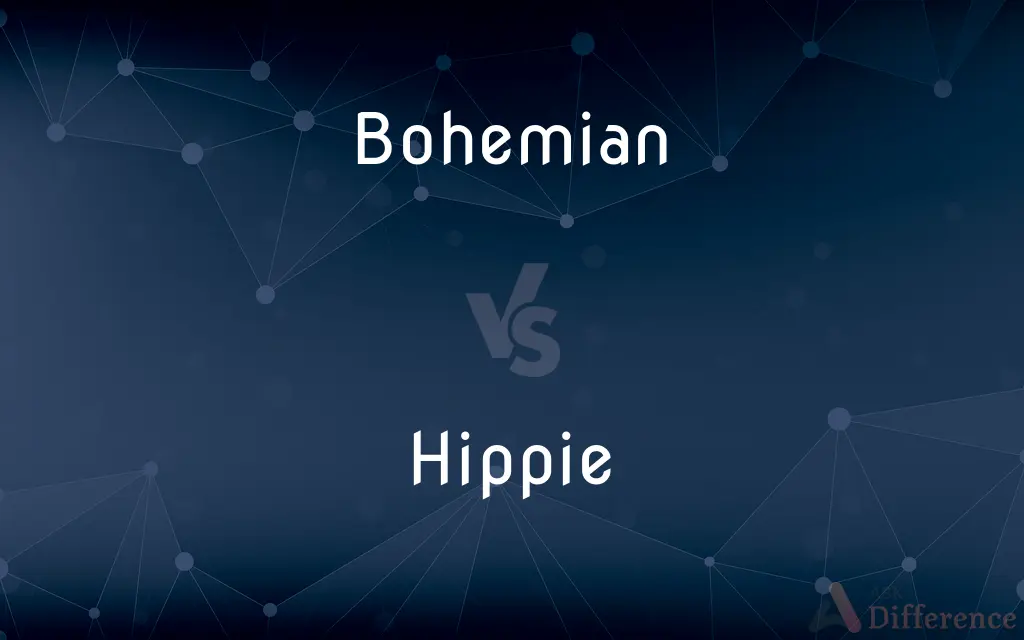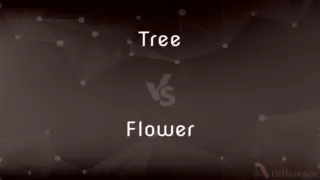Bohemian vs. Hippie — What's the Difference?
By Tayyaba Rehman — Updated on October 23, 2023
Bohemian refers to someone with an unconventional lifestyle often linked to arts, while a Hippie is tied to the 1960s counterculture movement, emphasizing peace, love, and nature.

Difference Between Bohemian and Hippie
Table of Contents
ADVERTISEMENT
Key Differences
Bohemian and Hippie are terms that describe unconventional lifestyles, but they originate from different eras and have unique cultural significance. While Bohemian is an older term, rooted in the artistic and literary communities of 19th century Europe, Hippie is a product of the 1960s American counterculture movement.
A Bohemian is often associated with a free spirit who disregards societal norms, especially in artistic or literary contexts. They might live in a way that's non-traditional, valuing artistic expression over material wealth. Conversely, a Hippie is recognized by their opposition to the mainstream, especially during the Vietnam War era, and their promotion of peace, love, and communal living.
The style associated with Bohemians is eclectic, pulling from various cultures and time periods. It's free-flowing, colorful, and artistic. Meanwhile, Hippie fashion is known for its psychedelic patterns, flower motifs, peace symbols, and tie-dye.
While both Bohemians and Hippies may challenge societal norms, Bohemians tend to do so more from an artistic or creative standpoint. Hippies, on the other hand, often combined their lifestyle choices with political activism, especially regarding war, environmental issues, and civil rights.
In essence, while there's overlap in the free-spirited nature of Bohemians and Hippies, their origins, primary influences, and cultural expressions make them distinct.
ADVERTISEMENT
Comparison Chart
Origins
Rooted in 19th century Europe's artistic communities.
Emerged from the 1960s American counterculture movement.
Key Values
Artistic expression, freedom from societal norms.
Peace, love, nature, and communal living.
Fashion
Eclectic, free-flowing, artistic.
Psychedelic patterns, tie-dye, peace symbols.
Primary Influence
Artistic or creative standpoint.
Political activism, especially related to war, environment, civil rights.
Representation
Non-traditional living, valuing expression over material wealth.
Opposition to mainstream societal norms of the 1960s.
Compare with Definitions
Bohemian
An individual leading an unconventional lifestyle, often in the arts.
She lived a Bohemian lifestyle, moving from one art commune to another.
Hippie
Someone with a laid-back, unconventional lifestyle, emphasizing nature and community.
The Hippie ethos shaped her approach to life, from her vegetarian diet to her handmade clothes.
Bohemian
Someone with free-spirited and non-traditional habits or tastes.
Her Bohemian dress sense always made her stand out in the crowd.
Hippie
A descriptor for things relating to the counterculture movement and its aesthetics.
The festival had a Hippie feel, complete with tie-dye shirts and peace signs everywhere.
Bohemian
An unconventional or nonconformist artist or writer.
Hippie
Pertaining to or characteristic of a subculture advocating peace, love, and harmony.
The Hippie movement significantly influenced music and fashion in the late 20th century.
Bohemian
A person indifferent to societal norms, especially in artistic pursuits.
As a Bohemian, he found beauty in the chaos of the city.
Hippie
A person of the counterculture movement of the 1960s, promoting peace and love.
He became a Hippie during the 60s, protesting the Vietnam War and living in communes.
Bohemian
(Archaic) A Romani person.
Hippie
An individual known for rejecting established institutions and values.
As a true Hippie, she believed in making love, not war.
Bohemian
Pertaining to Bohemia or its language and culture.
He was proud of his Bohemian heritage and often shared stories from his homeland.
Hippie
A hippie, also spelled as hippy, is a member of the counterculture of the 1960s, originally a youth movement that began in the United States during the mid-1960s and spread to other countries around the world. The word hippie came from hipster and was used to describe beatniks who moved into New York City's Greenwich Village, San Francisco's Haight-Ashbury district, and Chicago's Old Town community.
Bohemian
A native or inhabitant of Bohemia (now the western part of the Czech Republic).
Hippie
(1950s slang) A teenager who imitated the beatniks.
Bohemian
Relating to Bohemia or its people
Engraved Bohemian glass
The tombs of Bohemian kings
Hippie
(modern slang) A person who keeps an unkempt or sloppy appearance and has unusually long hair (for males), and is thus often stereotyped as a deadbeat.
Bohemian
A native or inhabitant of Bohemia.
Hippie
Someone who dresses in a hippie style.
Bohemian
A person of Bohemian ancestry.
Hippie
One who is hip.
Bohemian
The Czech dialects of Bohemia.
Hippie
Of or pertaining to hippies.
That dress looks very hippie.
Bohemian
An itinerant person; a vagabond.
Hippie
Not conforming to generally accepted standards.
They used a bunch of hippie compression formats instead of the usual RAR and ZIP.
Bohemian
A person with artistic or literary interests who disregards conventional standards of behavior.
Hippie
Someone who rejects the established culture, dresses casually, and advocates extreme liberalism in politics and lifestyle. Used especially of those in the late 1960's, mostly in their late teens and early twenties, who conspicuously rejected traditional culture by dressing casually, if male wore their hair long, and wore folksy or used clothing adorned with beads, headbands, and often flowers; they emphasized the importance of love and direct personal relations rather than success-oriented businesslike behavior, strove for spontaneity, sometimes lived communally, and in some cases tried to expand their consciousness by various psychological techniques such as meditation, or through the use of consciousness-altering drugs such as marijuana or LSD. By the end of the Vietnam war in the 1970's, the numbers of people living a visibly hippie lifestyle had dramatically decreased, though some people continue to develop similar views and live with the same outlook.
Bohemian
Unconventional, especially in habit or dress.
Please tell me you're not one of Toulouse's oh-so-talented, charmingly bohemian, tragically impoverished protégés! -Nicole Kidman, Moulin Rouge!
Hippie
Someone who rejects the established culture; advocates extreme liberalism in politics and lifestyle
Bohemian
A native of Bohemia.
Bohemian
The language of the Czechs (the ancient inhabitants of Bohemia), the richest and most developed of the dialects of the Slavic family.
Bohemian
A restless vagabond; - originally, an idle stroller or gypsy (as in France) thought to have come from Bohemia; in later times often applied to an adventurer in art or literature, of irregular, unconventional habits, questionable tastes, or free morals.
She was of a wild, roving nature, inherited from father and mother, who were both Bohemians by taste and circumstances.
Bohemian
A member of a nomadic people originating in northern India and now living on all continents
Bohemian
A native or inhabitant of Bohemia in the Czech Republic
Bohemian
A nonconformist writer or artist who lives an unconventional life
Bohemian
Of or relating to Bohemia or its language or people
Bohemian
Unconventional in especially appearance and behavior;
A bohemian life style
Bohemian
A descriptor for eclectic and artistic styles or behaviors.
The café had a Bohemian vibe, with poets and musicians gathering every evening.
Common Curiosities
What are the core beliefs of Hippies?
Hippies often advocate for peace, love, nature, and communal living.
Are Bohemian and Hippie synonymous?
No, while both suggest unconventional lifestyles, they have distinct cultural backgrounds and values.
Can someone be both a Bohemian and a Hippie?
Yes, there's overlap in values, but they're distinct cultural phenomena.
When did the term Bohemian originate?
The term "Bohemian" originated in the 19th century, associated with European artists and writers.
What's the relation of Bohemians to Bohemia?
The term "Bohemian" initially referred to the people of Bohemia, but its meaning evolved over time.
Why are Bohemians associated with the arts?
Bohemians traditionally rejected conventional lifestyles, gravitating towards artistic communities.
How did Bohemian culture spread?
Through literature, art, and migration, Bohemian ideals spread throughout Europe and beyond.
Were Hippies primarily American?
The movement started in the U.S., but Hippie culture spread internationally.
Is Bohemian a fashion style?
Yes, Bohemian fashion is eclectic, emphasizing free-flowing and artistic elements.
Did Hippies have a signature music style?
Yes, Hippies were linked to psychedelic rock, folk music, and the peace and love themes of the 1960s.
Was drug use a major part of Hippie culture?
While not all Hippies used drugs, psychedelic substances like LSD were associated with the movement.
Were Hippies political?
Many Hippies were politically active, especially concerning war, civil rights, and environmental causes.
Do Bohemian values still resonate today?
Yes, many modern creatives embrace Bohemian ideals in their work and lifestyles.
Are Bohemian and Hippie lifestyles still prevalent today?
While not as dominant, elements of both lifestyles continue to influence modern culture.
How did the Hippie movement influence society?
The Hippie movement influenced music, fashion, and brought attention to social and environmental issues.
Share Your Discovery

Previous Comparison
Tree vs. Flower
Next Comparison
Telegram vs. FaxAuthor Spotlight
Written by
Tayyaba RehmanTayyaba Rehman is a distinguished writer, currently serving as a primary contributor to askdifference.com. As a researcher in semantics and etymology, Tayyaba's passion for the complexity of languages and their distinctions has found a perfect home on the platform. Tayyaba delves into the intricacies of language, distinguishing between commonly confused words and phrases, thereby providing clarity for readers worldwide.














































